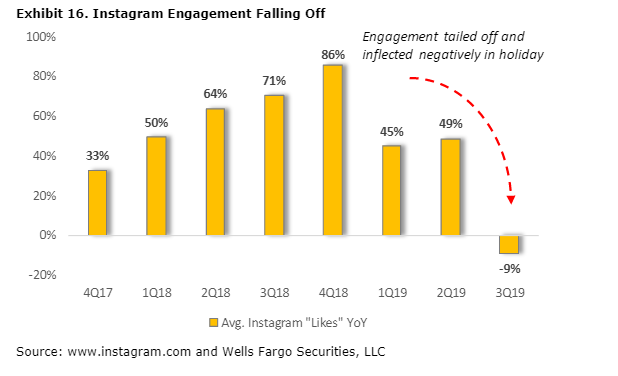
Amid a lack of tangible progress in trade talks between the U.S. and China, growing tensions around the world, as well as slowing economies, some on Wall Street are sounding the alarm that major international brands could soon fall out of favor.
And signs are mounting that Canada Goose, the Toronto-based maker of luxury outgear, could be one of the first to suffer.
The company’s stock was downgraded on Thursday to “market perform” from “outperform” at Wells Fargo, which cited valuation concerns, recent weak consumer engagement trends, and significant pressures facing multi-national brands. Wells Fargo also lowered its price target on the stock from $80 to $68.
“The recent performance of multi-national brands has been lackluster over the past several months, leading to revisions across the space,” Wells Fargo senior analyst Ike Boruchow wrote in a note to clients. “We believe the primary drivers for this weakness include…tourism going from good to bad, Europe becoming very problematic, and fears around an eventual slowdown in China.”
Shares of Canada Goose fell more than 7 percent on Thursday, the stock’s worst day of trading in more than a month. The parka maker’s stock has plunged more than 20 percent from its recent high in mid-November.
Wells Fargo added that a slowdown in Google searches and Instagram engagement over the holiday season has sparked further concerns that customers could be pulling back. Since the company’s IPO in early 2017, Google search trends for “Canada Goose” had been increasing at a double-digit rate each quarter but started to decelerate both in Canada and globally late last year.
“[This is] somewhat concerning for a stock that currently relies heavily on momentum and robust growth to keep their premium valuation justified,” Wells Fargo said. “December is the peak holiday month and the most likely time of year consumers would search for the brand on Google when shopping.”
Despite the headwinds, Wells Fargo did note that Canada Goose’s stock trades at a premium to a cohort of global luxury retailers like Burberry, Ferragamo, Moncler, Prada and Tiffany’s.
Though Canada Goose has surged more than 160 percent since its IPO, the outdoor apparel maker has come under pressure over the past month amid escalating political and economic tensions between China and Western countries, including the U.S. and Canada. The stock dropped 17 percent over a one-week span in December after reports surfaced that Chinese consumers were boycotting the brand.
China’s population accounts for one-third of the world’s luxury consumption, according to analyst estimates, and the country is a pivotal growth market for brands based in Europe and North America. Canada Goose has been pushing to expand in China, opening locations in Hong Kong and Beijing, where it will be competing with local knockoff brands.
But Canada Goose’s ambitions in China have run into hurdles. The opening of the highly anticipated location in Beijing was delayed two weeks, to December 31, and missed the key holiday season.
Wells Fargo joins a chorus of business leaders that have sounded the alarm that the ongoing trade tensions could hurt key North American brands.
In early November, Procter & Gamble CEO David Taylor told CNBC that he was concerned about the long-term damage the global trade war could have on consumer behavior and spending.
“What I worry most about with the trade war is it destroys consumers’ confidence in American brands,” Taylor said at the time.
The U.S. has set a March 2 deadline for negotiators to reach a deal; if no deal is reached, tariffs are set to increase on $200 billion in Chinese goods.
Commerce Secretary Wilbur Ross said earlier on Thursday that China and the U.S. were not close to striking a trade deal. Ross told CNBC’s “Squawk Box ” that the U.S. is “miles and miles ” from a trade deal with China, adding the two countries have “lots and lots of issues.”

Be the first to comment